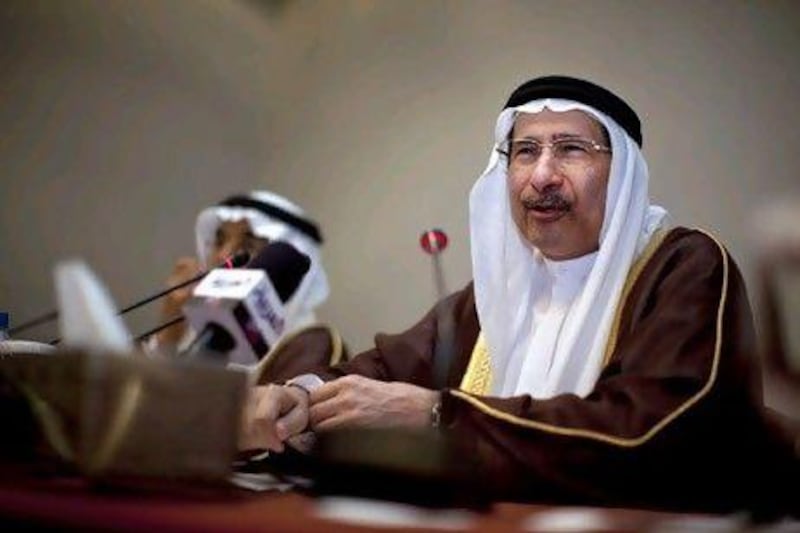GCC governments are facing a fiscal policy predicament. Against a backdrop of high oil prices and regional unrest in Bahrain and elsewhere in the Middle East, officials are increasing public spending to improve life for their citizens and upgrade infrastructure.
Saudi Arabia last month unveiled an estimated US$37 billion (Dh135.89bn) social package, equating to more than 8 per cent of GDP. In the same month, Oman increased its minimum wage by 43 per cent to 200 rials (Dh1,908) per month. Bahrain's King Hamad bin Issa Al Khalifa offered 1,000 dinars (Dh9,736) for each family, while Kuwait's government handed each citizen the equivalent of $3,500.
In the UAE, the Government has promised to spend Dh5.8bn to provide water and electricity to homes and shops in the Northern Emirates.
Such measures come on top of hefty annual budgets already unveiled by many states. In addition, Saudi Arabia is spending $400bn until 2013 under an immense infrastructure improvement plan.
This flurry of spending would appear to present few challenges. Ample fiscal reserves mean big expenditure programmes should make only small dents in most governments' finances. However, further scrutiny reveals that expansionary spending carries risks.
The IMF warned the UAE last week of the need to avoid the pitfalls of the pre-recession era. It has advised against a return to the extravagant spending that occurred in recent years.
At the time, rising oil prices and a credit-fuelled property bubble led to advancing growth rates but rising inflation. Policymakers stoked an already overheating economy through high expenditure, the IMF says.
"Government-related entity borrowing was high, but fiscal policy also played its part: the Government increased its spending and this was not necessarily appropriate in an overheating economy, as it intensified the pressure on the economy and inflation," says Taline Koranchelian, an IMF adviser who led a mission to the UAE last week on behalf of the organisation.
Dubai was perhaps guiltiest of such an approach. The emirate embarked with gusto on an ambitious array of building projects including the man-made Palm islands off its coast and the Burj Khalifa, the world's tallest tower.
The global financial downturn and the ensuing steep decline in property prices knocked the emirate backwards and required $20bn in assistance from the Central Bank and the Abu Dhabi Government.
The IMF advocates a counter-cyclical fiscal stance, encouraging spending during downturns and a tightening of credit during inflationary periods.
Sultan al Suwaidi, the UAE Central Bank Governor, last week appeared to support the IMF's advice.
"We should monitor the GDP rate of growth and adjust investment in the number of projects," he says. "We believe the production of projects should be constant so it should not affect the rate of growth." The IMF forecasts the country's economy will expand by 3.3 per cent this year, with consumer price inflation expected to reach 4 per cent.
Likewise in Saudi Arabia, officials will want to avoid a repeat of 2008, when an expansionary fiscal policy contributed to inflation being pushed up to near double-digit levels.
After a visit to nearby Qatar, the IMF offered similar advice. The country is rolling out a multibillion-dollar infrastructure upgrade as it prepares to host the Fifa World Cup in 2022. While the IMF agreed that the expansionary fiscal stance was broadly appropriate, it recommended that authorities stand ready to adjust policies if demand pressures re-emerged.
Containing current expenditure and broadening the tax base would be critical to reducing the budget's dependence on hydrocarbon revenues, the IMF stresses.
So far, GCC states have not made serious headway in diversifying their revenue base by imposing taxes. The UAE has studied the feasibility of a value-added tax as part of a region-wide initiative. No substantial plans have been formed, however.
For those countries increasing their spending for social initiatives, other risks exist. While some of the measures announced were temporary, the time frames for others are less clear.
"There's a risk that if measures are not one-off they can become difficult to withdraw," said Paul Gamble, the head of research at Jadwa Investment, an asset manager in Saudi Arabia.
That problem could be exacerbated if oil prices dip again. Last week's earthquake and tsunami in Japan dragged oil prices down initially.
A fall in crude prices to below $67 per barrel would mean Saudi Arabia's budget would slip into the red, according to Banque Saudi Fransi.
Bahrain is already struggling to pay for its measures because, unlike some other states in the region, it is constrained in its ability to increase oil production. Unrest in the country prompted other states last week to approve a $20bn economic aid package for the kingdom and fellow GCC member Oman, which has also been shaken by protests.
Time will tell how effective the GCC's measures are at improving living standards. Gauging the sustainability of higher spending will also take time.





